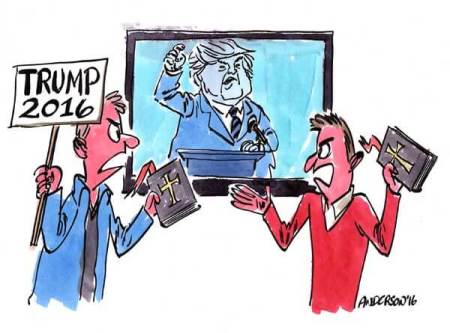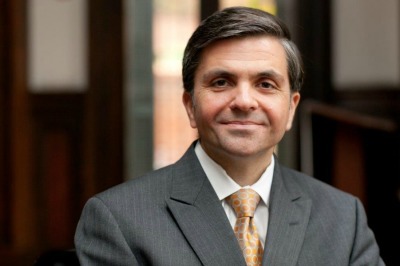Falwell, Trump, Christianity & Nationalism

Liberty University President Jerry Falwell Jr's endorsement of Donald Trump has provoked important questions about Evangelicals in retail politics.
The senior Falwell, of course, was a founder of the Religious Right who helped rally many Evangelicals to Ronald Reagan and to conservative politics in the 1980s. It's now common among many younger Evangelicals to bemoan the perceived failures and overreach of the old Religious Right.
The younger Falwell has been widely critiqued by many conservative Evangelicals for endorsing a casino magnate not renowned for deep commitment to Christian ethical aspirations. Some lament the Evangelical brand has been further tarnished.

Falwell is just one of tens of millions of American Evangelicals. He speaks for a segment of that highly decentralized demographic. Nobody speaks for all, and perhaps no single figure speaks for most.
Strong majorities, typically 70-75%, of white Evangelicals, who altogether are about 25% of America, vote Republican. But millions vote for Democrats. Among this cohort of about 80 million, millions of Evangelicals no doubt support Hillary Clinton or Bernie Sanders. This diversity is true for nearly all of America's faith communities.
Among conservative Evangelicals there are growing apprehensions, sometimes even panic, about the country's direction. Some, no doubt including many Trump supporters, hope for a strong leader who can steer America in a dramatically different direction. Others are more downbeat or even ambivalent about intense Evangelical political engagement.
The senior Falwell was influenced by the influential late Presbyterian thinker and cultural critic Francis Schaeffer, who instructed a generation or two of Evangelical elites to battle for political and cultural reclamation against encroaching secularism. Schaeffer has fallen from favor, and most even well read Evangelical Millennials likely are barely aware of him.
There is no equivalently influential intellectual political counselor among American Evangelicals today at a time when such counsel is more needed than ever. But there are good resources available, such as the recently published book One Nation Under God: A Christian Hope for American Politics, by Bruce Ashford of Southeastern Baptist Theological Seminary, co-authored with Chris Pappalardo. (I've not yet finished reading it but hope to review it soon!) Ashford has also been writing some excellent pieces for Canon and Culture, a Southern Baptist online journal, which encapsulate a lot of his perspective, the most recent of which is "The (Religious) Problem With Nationalism."
Trump has been widely described as a nationalist though Ashford does not mention him in his Christian warning against nationalism, which he describes as an idolatry elevating nation over God.
A commendable patriotism looks "on our country with affection, devotion, and even a measure of pride," he writes. "To effectively counter nationalism, we need not love our own nation less; we need only to love, honor, and obey God more."
He ends hopefully: "For all of our failings as a country, we still have the opportunity to shape politics through the lens of the gospel."
These points are very solid. Where I might press for elaboration is how to apply this Christian political theology to the wider public that is not and never has been universally devout. I'm also less certain that true nationalism as an ideology has ever been a threateningly powerful force in American politics. Also I wonder if a measured nationalism is not desirable in some historical contexts.
There are many forms of nationalism, not all of them diabolical. The most infamous and murderous was the Third Reich's National Socialism. Somewhat more benign was Franco's Spanish nationalism, which was authoritarian but not totalitarian and which Catholics supported against anti-Catholic socialists. Lebanon's Maronite Catholic Philangists descend from Francoism.
Other forms of Arab nationalisms, often supported by Christians, sought modern unifying alternatives to Muslim theocracy. The most vicious and disastrous forms of Arab nationalism were the Baathist parties of Iraq and Syria, producing Saddam Hussein and the Assads. Turkey's Ataturk modernized Turkey with secular nationalism.
Chinese nationalism sought a modernizing unity against feudalism and warlords, founded by Sun Yat-Sen and popularized by Chiang Kai-shek, a Methodist, whose Kuomintang Party still survives in Taiwan.
India gained independence under its nationalist Congress Party, which sought national cohesion under a secular regime aspiring to equality for all religionists and castes. The main opposition against Congress is the now ruling Hindu party, often distrusted by Christians and Muslims. The post-WWII Third World anti-colonial struggles were typically led by nationalists, whose rivals were often Marxists. The nationalists esteemed national identities while the Marxists ostensibly identified with international Communist brotherhood. Other rivals to nationalism were tribalism.
Patriotism in early America often meant primary loyalty to colony or state. Early American presidents sought a form of nationalism against local parochialism. There was no certainty that a national union would survive. When the Civil War arrived, Confederates like Lee, who reverred Virginia, felt primary allegiance owed to native states. In that case, a greater nationalism could have been an antidote to disunion and war.
Some nationalisms are rooted in blood and ethnicity. Others have a religious component. Still others are attempts to foster a greater unity that transcends ethnicity and religion. Christians in many cultures have and do support nationalisms in their context as preferable to available political alternatives. Sometimes they are right to do so. Other times, they err, if for understandable reasons.
American versions of nationalism have not often been rooted in ethnicity or religion but in, as Ashford notes, a concept of freedom traceable to our founding documents. Freedom understood apart from God is potentially dangerous, as Christians should understand. America's traditional understanding of freedom descends from a Christian anthropology but can be universally interpreted to affirm dignity and equal rights for all.
It's very important for theologically literate American Christians to understand subtleties between patriotism and nationalism. But such distinctions may be inconsequential to many less observant Christians not to mention the 25-30% of Amercans who are reputedly religiously unaffiliated. For many of them, a form of nationalism may be more morally uplifting than hyper individualism or ghettoization into racial, sexual, gender, or economic tribal identities. A nationalist American will be a better citizen and neighbor than a nihilist, anarchist or indifferent materialist.
Gandhi was a nationalist. So was Nelson Mandela. Both were instruments of Providence who strove to liberate and unite their peoples against ethnic and religious division without conscious (in Gandhi's case) or strict (in Mandela's case) adherence to the Christian understanding of nation.
If America becomes more secular and less Christian, some form of nationalism may offer the available threads of continued community and pursuit of the common good. Intra-Christian conversation about God's purpose for the nation will remain important to the churches but less so for the wider public.
Present controversies among Evangelicals over Jerry Falwell Jr. and Donald Trump illustrate division and confusion among American Christians over political theology. But hopefully they will also fuel additional thoughtful analysis by young Evangelical writers like Ashford for counsel to the church and society about our national life together.
Article posted here.





















